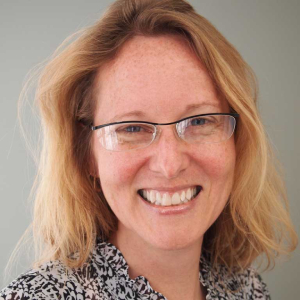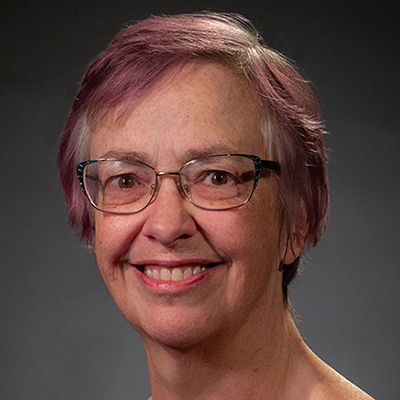Charlotte Westerhaus-Renfrow, a faculty chair of the Kelly-Indianapolis Undergraduate Program and PBL Lab faculty fellow, has been supportive of project-based learning before she even knew the name for it. She views project-based learning as a way to engage students, teach them skills, and help them learn, and she attributes her support of it to her dad.
“My father said, ‘I want you to get a college education to solve real-world problems. If you can't solve a real-world problem, why are you getting your education? If you can’t help real people, then what was higher education for?’ So that's probably why I'm so supportive of it,” Westerhaus-Renfrow said.
Her support also has led her to have a lot of experience with using project-based learning. For one, within her experience at the Kelley School of Business, she has been able to work with project-based learning and see how I-CORE, which gives Kelley students real-time experiences, impacts students. She has also been able to have access to faculty who act as role models within project-based learning.
The other faculty fellows also expressed their support for project-based learning, citing their previous experience with it. Pierce, who has used project-based learning in his courses for six years, has experimented with when and how to apply this learning in the past. His experience and passion for project-based learning are so strong that even another faculty fellow, Oesch-Minor, mentioned it when discussing the benefits of including this type of learning in degree programs.
“I'm thinking of David Pierce's sports management class, where they literally get on the phone and sell tickets to events; this is one of the number one things people have to do when they get into the sports field,” Oesch-Minor said. “They are living their education, rather than reading about it.”
For Oesch-Minor, her experience is far-reaching as well, including her 20 years of teaching using integrated experiential learning and project-based learning. She also has experience as an admissions counselor, an NAIA Division II volleyball coach, and an assistant dean of student life at another college.
Within her experience at IUPUI with project-based learning, she has allowed students in her W-131 course to explore their own or other contact zones, or the mini-cultures people live in. Some of the contact zones her students have experienced include going camping, shadowing in a hospital, visiting houses of worship, going fishing, feeding cows, and many more. As a part of this, students write a film review on a documentary related to this immersion experience, write a feature style narrative on their immersion experience, write an argument within their experience topic, and then put it all on an ePortfolio.
Robertson, who has been teaching at IUPUI for more than 20 years, has been involved in many projects and knows how to work with faculty and engage with students to ensure work is being done to push forward student learning. Because of her experience, she wants to ensure there are a range of opportunities for students that they care about and that speaks to their interests.
“I want this opportunity for students to have an engaged experience that matters to them to be open to all students not, only students in their capstone at the end of four years, and not only students who are in things like honors programs or small programs on campus,” Robertson said.
To ensure students have access to these opportunities, the PBL Lab plans to work with faculty to develop more project-based learning within curriculums, scaffold it to ensure students complete four project-based learning opportunities throughout their degree, and create a searchable tool for students to find more project-based learning opportunities.
It may come with some challenges between all these things they want to accomplish, especially if faculty are hesitant to implement it.
“What's not going to be a challenge is students, because students really embrace this. What's going to be a challenge and an opportunity is for faculty who have never used this before, haven’t seen the benefits of it before, or haven’t received professional development for it before, to grasp it. Because change is difficult,” Westerhaus-Renfrow said.
To combat the challenge of change, the plan would be to sway those on the fence about project-based learning to support it. To help faculty implement and learn about project-based learning, the PBL Lab faculty fellows have a few plans. According to Pierce, they would like to develop a professional development tool kit for faculty.
“Through the toolkit, faculty can get quick, bite-sized chunks of tips, practices, and suggestions on how to integrate it into their own coursework,” Pierce said. “There's a lot of different elements of project-based learning, and we just want faculty to add one or two pieces each semester or each year.”
Oesch-Minor also suggested that faculty reach out to the fellows to get support or get involved in project-based learning on-campus. She also said that once they find out the support needed by faculty, they plan to build programming for them.
“Hopefully, we can begin to see public training opportunities as early as next spring,” Oesch-Minor said.
Once faculty has access to the support of the PBL Lab, and once faculty begins to work together, students, faculty, and staff can expect to see project-based learning become integrated into every level of degree programs, from freshman to senior year.
“We're going to try to find out where PBL is happening, and in those programs that are doing it really, really well and so they've got it scaled at least four levels, are accessible, and embedded in classes, and then we will highlight those programs," Oesch-Minor said.
Robertson also emphasized that the scaffolding will be done with pre-requisites and course timing in mind to help ensure students have access to project-based learning each year.
“Students don't always take the classes in the order we want,” Robertson said. “One of the things about scaffolding is, it has to reflect the reality of how students take classes.”
After it all comes into place, the question is: Who will all of this work benefit? According to the fellows, everyone.
“What benefits me as a faculty member, benefits my students, and what benefits my students, benefits me as a faculty member.” Westerhaus-Renfrow said. “It’s circular. It benefits all of us in higher education and all those who are going to be touched by it.”
About the Institute for Engaged Learning
The Institute for Engaged Learning promotes undergraduate learning through equitable access to and the effective use of High-Impact Practices to support student learning, engagement, and success. Their goal is to ensure that all 20,000 undergraduate students at IUPUI participate in four engaged learning experiences along an engaged learning pathway. Additional engaged learning experiences promoted by the Institute for Engaged Learning include:
To learn more about service learning visit https://csl.iupui.edu/





